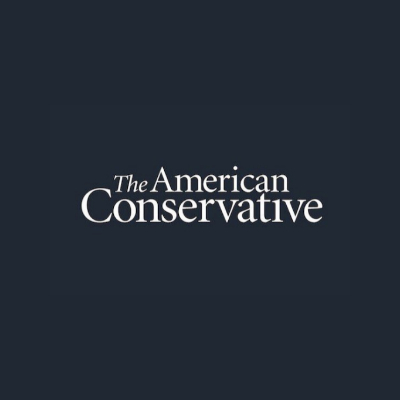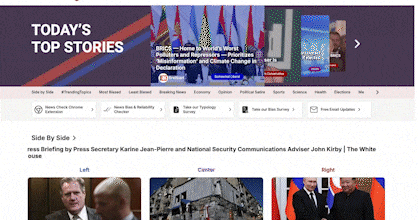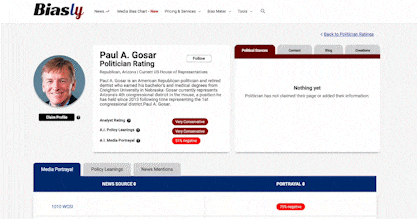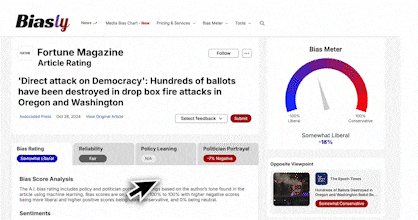 The American Conservative Article Rating
The American Conservative Article RatingCan Trump Resolve the North Korea Conundrum?
- Bias Rating
70% Medium Conservative
- Reliability
20% ReliablePoor
- Policy Leaning
92% Very Conservative
- Politician Portrayal
-19% Negative
Continue For Free
Create your free account to see the in-depth bias analytics and more.
Continue
Continue
By creating an account, you agree to our Terms and Privacy Policy, and subscribe to email updates. Already a member: Log inBias Score Analysis
The A.I. bias rating includes policy and politician portrayal leanings based on the author’s tone found in the article using machine learning. Bias scores are on a scale of -100% to 100% with higher negative scores being more liberal and higher positive scores being more conservative, and 0% being neutral.
Sentiments
4% Positive
- Liberal
- Conservative
| Sentence | Sentiment | Bias |
|---|---|---|
Unlock this feature by upgrading to the Pro plan. | ||
Reliability Score Analysis
Policy Leaning Analysis
Politician Portrayal Analysis
Bias Meter
Extremely
Liberal
Very
Liberal
Moderately
Liberal
Somewhat Liberal
Center
Somewhat Conservative
Moderately
Conservative
Very
Conservative
Extremely
Conservative
-100%
Liberal
100%
Conservative

Contributing sentiments towards policy:
69% : It was a historic event; Trump became the first sitting president to meet a North Korean leader, the two sides spoke of a wish for peace and denuclearization of the peninsula, and seemed to demonstrate a real personal affinity for one another.53% : Whether due to nationalism, willingness to dispense with communist ideas when convenient, the regime's successful isolation of its population from outside influence, or a combination of all three, Pyongyang defied the predictions of observers.
53% : Evidence for this can be found in the first administration of Donald Trump, as the North carried out its sixth (and at the time of writing, final) nuclear test, claiming to have acquired hydrogen-bomb technology, and tested a long-range missile capable of reaching any part of the continental U.S., all of which had happened by late 2017.
49% : Though the EU and U.S. spoke harsh words and imposed sanctions, they ultimately acquiesced to the annexation in all but name.
47% : Impressed by Seoul's hosting of the 1988 Olympics, the Eastern Bloc countries began normalizing ties with South Korea, and in 1990, amid a late and ultimately doomed effort to solve its economic disintegration, the Soviet Union established official relations with Seoul for an aid package, breaking military cooperation with the North.
47% : Even South Korea, a military dictatorship in its economic reform period, had liberalized to accommodate the international expectations of democracy and laissez-faire economics, characterized by free trade.
34% : The former believe Trump can use his rapport with the North to establish a breakthrough on the peninsula and lower the tension, if not resolve the conflict outright.
28% : It is also a nonstarter to expect Trump to butt out of the Indo-Pacific region entirely and declare the Korean Peninsula, and region as a whole, are not America's problem -- too much trade travels through the continent and its surrounding waterways, and for the U.S. no longer to play a role in deterring regional conflict via its system of alliances would invite conflicts of the sort for which Trump roundly criticized the Biden administration.
28% : If Trump continues to engage and signal to the North a willingness to make a deal -- perhaps one that supports the North's space exploration in return for a verifiable cap on its weapons development -- it may yet meet the North's price.
26% : Trump, however, never appeased the North -- even in his engagement he wanted the North to turn decisively away from nuclear stockpiling and building the capacity to threaten the U.S. When the North refused, talks broke down.
20% : Donald Trump tried a couple very different approaches to resolving the Korean Peninsular standoff: threats of decisive military action to warn the North away from nuclear proliferation and direct engagement.
19% : Disappointed at the results of the discussion, and with Trump departing from the White House in 2021 for a far less bold Biden administration, Kim seemingly sought an entirely different tack.
19% : Like any self-avowed dealmaker, Donald Trump will not seek a deal that that involves unilateral concessions -- and with Russia currently enabling the North, Pyongyang may not see the need to concede anything itself.
*Our bias meter rating uses data science including sentiment analysis, machine learning and our proprietary algorithm for determining biases in news articles. Bias scores are on a scale of -100% to 100% with higher negative scores being more liberal and higher positive scores being more conservative, and 0% being neutral. The rating is an independent analysis and is not affiliated nor sponsored by the news source or any other organization.

























